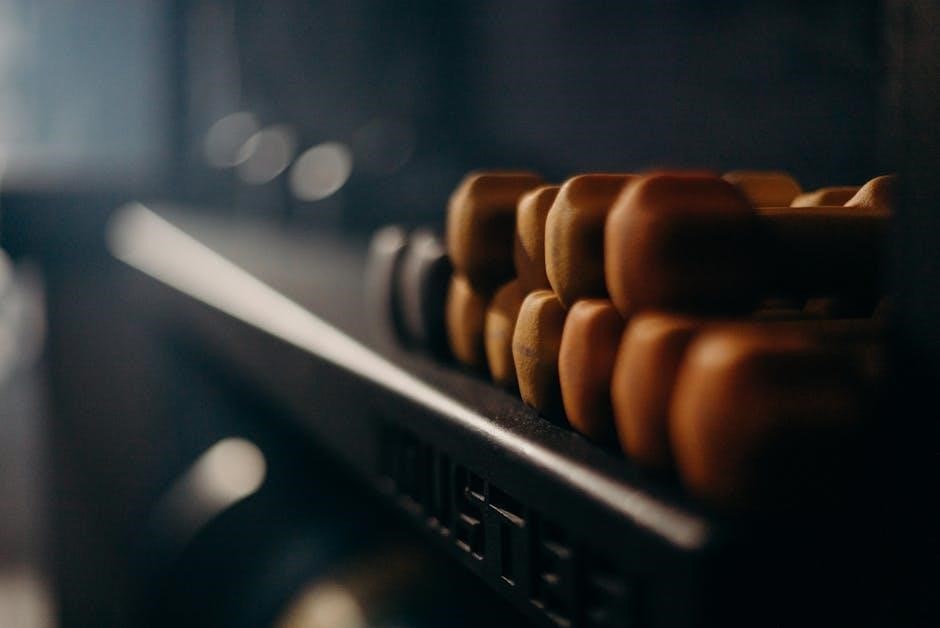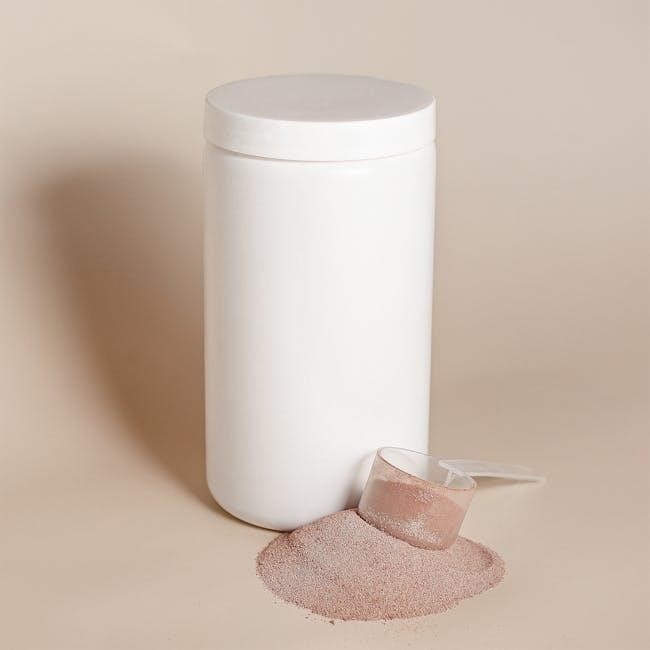A well-structured diet plan is crucial for muscle gain‚ focusing on balanced macronutrients‚ proper caloric intake‚ and nutrient-dense meals to support growth and recovery effectively;
1.1 Importance of Nutrition in Muscle Building
Nutrition is the backbone of muscle building‚ as it provides the necessary fuel for growth and recovery. A balanced diet ensures adequate protein for muscle repair‚ carbohydrates for energy‚ and healthy fats for hormone production. Without proper nutrition‚ even the most intense workouts may fail to yield desired results. Protein is particularly crucial‚ as it supplies amino acids for muscle synthesis. Additionally‚ maintaining a calorie surplus is essential to provide the energy muscles need to grow. Hydration also plays a vital role‚ as water supports cellular functions and recovery. A well-structured diet plan ensures all these elements are optimized‚ making nutrition the cornerstone of any successful muscle-building journey.
1.2 Overview of a Muscle Gain Diet Plan
A muscle gain diet plan focuses on creating a calorie surplus with balanced macronutrients to fuel growth and recovery. It emphasizes high protein intake‚ complex carbohydrates‚ and healthy fats. The plan typically includes 5-6 meals per day‚ spaced out to maintain energy levels and support muscle synthesis. Hydration is also prioritized to enhance recovery and overall performance. The diet avoids processed foods‚ added sugars‚ and alcohol‚ opting instead for whole‚ nutrient-dense options. This structured approach ensures consistent muscle growth while minimizing fat gain. By tailoring the plan to individual needs‚ it becomes a powerful tool for achieving lean‚ strong muscle over time.

Key Principles of a Muscle Gain Diet
A muscle gain diet prioritizes macronutrient balance‚ sufficient caloric surplus‚ and optimal meal frequency to fuel muscle synthesis and recovery‚ supported by consistent hydration for peak performance.
2.1 Macronutrient Ratios for Muscle Gain
A muscle gain diet typically recommends a macronutrient ratio of 25% protein‚ 50% carbohydrates‚ and 25% fats. Protein is essential for muscle repair and growth‚ while carbohydrates provide energy for workouts. Healthy fats support hormone production‚ including testosterone‚ which aids muscle development. This balance ensures adequate nutrition for muscle synthesis and recovery. Focus on high-quality protein sources like lean meats‚ fish‚ and legumes‚ complex carbs such as whole grains and vegetables‚ and healthy fats from nuts‚ seeds‚ and avocados. Adjusting these ratios based on individual needs and progress can further optimize muscle gain.
2.2 Caloric Surplus: How Much to Eat
To gain muscle‚ a caloric surplus is essential‚ meaning you must consume more calories than you burn. Aim for an additional 250-500 calories daily above your maintenance level. For most individuals‚ this translates to a total intake of 2‚600-3‚000 calories per day‚ depending on factors like age‚ weight‚ and activity level. A 30-year-old aiming for muscle gain might target 2‚421.55 calories as a baseline‚ increasing to 2‚600-3‚000 with the surplus. Adjustments should be gradual‚ monitoring progress every 1-2 weeks. Ensuring these calories come from nutrient-dense foods helps minimize fat gain while maximizing muscle growth;
2.3 Meal Frequency and Timing
Eating 5-6 smaller meals throughout the day can help maintain muscle protein synthesis and energy levels. Aim for three main meals and 2-3 snacks‚ spaced every 2-3 hours. Post-workout nutrition is critical‚ with a meal or shake containing protein and carbohydrates within 1-2 hours after exercise. Timing meals around workouts ensures optimal recovery and growth. Consistency in meal timing supports metabolic efficiency and muscle-building efforts. Adjusting frequency based on individual schedules and training routines can enhance results. Proper timing helps balance macronutrient intake‚ maintaining an anabolic state for muscle growth.

2.4 Role of Hydration in Muscle Growth
Hydration plays a vital role in muscle growth and recovery. Water makes up approximately 80% of muscle tissue‚ and even mild dehydration can impair physical performance and recovery. Proper hydration ensures nutrients and amino acids are efficiently transported to muscles‚ supporting growth and repair. Aim to drink 8-10 glasses of water daily‚ adjusting for activity levels. Additionally‚ include hydrating foods like fruits and vegetables in your diet. Dehydration can lead to muscle soreness‚ fatigue‚ and decreased protein synthesis. Staying hydrated also aids in waste removal‚ which is essential for maintaining optimal muscle function. Prioritize water intake to maximize muscle growth and overall health.

Sample 7-Day Meal Plan for Muscle Gain
A structured 7-day meal plan provides balanced nutrition‚ optimizing muscle growth with high protein‚ adequate carbs‚ and healthy fats‚ ensuring calorie surplus and recovery support daily.

3.1 Day 1: High-Protein Breakfast and Post-Workout Meals
Start your week with a nutrient-packed breakfast‚ such as scrambled eggs with whole-grain toast or oatmeal topped with nuts and berries. Include a protein shake or Greek yogurt for added protein. Mid-morning‚ snack on nuts or a fruit smoothie. Lunch could feature grilled chicken breast with quinoa and steamed vegetables‚ ensuring a balance of carbs and protein. Post-workout‚ refuel with a whey protein shake and a banana for quick recovery. Dinner should include lean meats like turkey or fish‚ paired with sweet potatoes and green beans. Stay hydrated throughout the day‚ aiming for 8 glasses of water. This structure optimizes muscle recovery and growth while maintaining energy levels.
3.2 Day 2: Balanced Carbohydrates and Healthy Fats
Begin Day 2 with whole-grain pancakes topped with fresh berries and a drizzle of almond butter for a mix of complex carbs and healthy fats. Mid-morning‚ enjoy an apple with a handful of walnuts for natural carbs and fats. Lunch features grilled chicken breast with quinoa‚ roasted vegetables‚ and a side of avocado‚ ensuring a balance of protein‚ carbs‚ and fats. Post-workout‚ consume a smoothie with oats‚ banana‚ and peanut butter for sustained energy. Dinner includes salmon‚ sweet potato mash‚ and steamed broccoli‚ providing omega-3 fatty acids and complex carbs. Throughout the day‚ emphasize hydration and portion control to maintain energy and support muscle growth. Adjust portion sizes based on individual caloric needs for optimal results.
3.3 Day 3: Focus on Lean Meats and Complex Carbs
Day 3 emphasizes lean meats and complex carbs to fuel muscle growth and energy. Start with scrambled eggs‚ spinach‚ and whole-grain toast for breakfast‚ paired with a protein smoothie. Mid-morning‚ snack on Greek yogurt with mixed berries and a sprinkle of granola. Lunch features grilled chicken breast with quinoa‚ roasted vegetables‚ and a side of mixed greens. Post-workout‚ refuel with a whey protein shake and a banana. Dinner includes turkey breast‚ mashed sweet potatoes‚ and steamed green beans. Complex carbs provide sustained energy‚ while lean meats supply essential protein for muscle repair and growth. Adjust portion sizes based on individual caloric needs to maintain a surplus for muscle gain.
3.4 Day 4: Incorporating Plant-Based Proteins
Day 4 focuses on plant-based proteins to diversify your muscle-building diet. Breakfast includes a tofu scramble with spinach‚ mushrooms‚ and whole-grain toast. Mid-morning‚ snack on almond butter with whole-grain crackers. Lunch features a chickpea and quinoa salad with avocado and mixed greens. Post-workout‚ enjoy a plant-based protein smoothie with pea protein‚ banana‚ and almond milk. Dinner consists of lentil soup with brown rice and steamed broccoli. This day highlights the importance of plant-based proteins like lentils‚ chickpeas‚ and tofu‚ which are rich in essential amino acids and fiber. Pairing these with complex carbs ensures sustained energy and muscle recovery; Stay hydrated and adjust portions to maintain your caloric surplus for optimal muscle growth.
3;5 Day 5: High-Calorie Foods for Muscle Growth
Day 5 emphasizes high-calorie foods to support muscle growth and recovery. Start with a breakfast of whole eggs‚ cheese‚ and whole-grain toast. Mid-morning‚ enjoy Greek yogurt with mixed nuts and dried fruits. Lunch includes grilled chicken breast with roasted sweet potatoes and a drizzle of olive oil. Post-workout‚ consume a protein shake with almond butter and oats. Dinner features salmon with quinoa and steamed asparagus‚ finished with a tablespoon of olive oil. Before bed‚ have a casein protein shake with peanut butter. This day focuses on calorie-dense‚ nutrient-rich foods to maximize muscle growth while maintaining a balanced diet. Adjust portion sizes to meet your caloric needs and support lean muscle development.
3.6 Day 6: Low-Fat‚ High-Protein Meals
Day 6 focuses on low-fat‚ high-protein meals to optimize muscle growth while minimizing fat intake. Start with scrambled egg whites‚ turkey bacon‚ and a slice of whole-grain toast. Mid-morning‚ have a protein smoothie with whey protein‚ spinach‚ and a splash of almond milk. Lunch includes grilled chicken breast with quinoa and steamed vegetables. Post-workout‚ consume a whey protein shake with BCAAs to aid recovery. Dinner features baked cod with mashed cauliflower and green beans. End the day with a small bowl of cottage cheese. This meal plan ensures high-quality protein intake while keeping fat consumption low‚ supporting lean muscle development and recovery.
3.7 Day 7: Recovery and Rest Day Nutrition
On Day 7‚ focus on recovery with nutrient-dense‚ anti-inflammatory foods. Start with oatmeal topped with berries and a scoop of whey protein for sustained energy. Mid-morning‚ have a handful of mixed nuts and a banana. Lunch includes grilled chicken breast with quinoa and steamed vegetables rich in antioxidants. Post-workout (or light activity)‚ consume a recovery shake with whey protein‚ BCAAs‚ and coconut water for hydration. Dinner features baked salmon‚ sweet potatoes‚ and asparagus‚ providing omega-3s for muscle repair. End the day with a small bowl of Greek yogurt and honey. Prioritize hydration and electrolyte balance to support muscle recovery and growth during this rest day.

High-Protein Recipes for Muscle Gain
High-protein recipes are essential for muscle growth‚ offering lean protein sources like chicken‚ fish‚ and plant-based options to fuel recovery and build strength effectively.
4.1 Chicken and Rice Bowl
The Chicken and Rice Bowl is a high-protein‚ nutrient-rich meal designed to support muscle growth and recovery. This dish typically includes grilled chicken breast‚ which provides lean protein essential for muscle repair and growth. Paired with complex carbohydrates from whole-grain rice‚ it offers sustained energy levels. Steamed vegetables like broccoli or spinach add essential vitamins‚ minerals‚ and fiber‚ enhancing overall nutritional balance. This meal is not only flavorful but also customizable‚ allowing for variations in seasonings and vegetable choices to keep the diet interesting. With approximately 500-600 calories per serving‚ it fits perfectly into a muscle gain diet plan‚ ensuring adequate calorie intake without excessive fat. The combination of protein‚ carbs‚ and healthy fats makes it a balanced and satisfying option for those focused on building lean muscle. Additionally‚ this meal supports post-workout recovery by replenishing energy stores and promoting muscle tissue repair. Incorporating this dish into your weekly meal plan can help maintain consistency and support your muscle-building goals effectively.
4.2 Salmon and Sweet Potato Meal
The Salmon and Sweet Potato Meal is a nutrient-dense option tailored for muscle gain‚ combining lean protein with complex carbohydrates. Salmon provides high-quality protein and omega-3 fatty acids‚ which reduce inflammation and support muscle recovery. Sweet potatoes offer sustained energy through complex carbs and are rich in vitamins like vitamin A. This meal is typically seasoned with herbs and spices for flavor; With approximately 550-650 calories per serving‚ it supports a caloric surplus while maintaining a balanced macronutrient profile. The dish is also versatile‚ allowing for variations like adding steamed vegetables or a side salad. This meal is ideal for post-workout recovery‚ as it replenishes energy stores and promotes muscle growth. Its combination of protein‚ healthy fats‚ and carbs makes it a standout choice for those aiming to build lean muscle effectively.
4.3 Protein Smoothie Recipes
Protein smoothies are a quick and nutritious way to boost your muscle-building diet. A classic recipe combines 1-2 scoops of whey protein powder‚ 1/2 banana‚ 1 cup frozen berries‚ 1 handful of spinach‚ and 1/2 cup unsweetened almond milk. Add 1 tablespoon peanut butter for healthy fats and 1 teaspoon honey for natural sweetness. This blend provides approximately 400-500 calories‚ with 35-50 grams of protein. The banana and berries add carbs for energy‚ while spinach contributes essential vitamins. Customize by swapping protein powder for plant-based options like pea or hemp‚ or adding 1/2 cup Greek yogurt for extra thickness and protein. Perfect for post-workout recovery or as a quick snack to meet your daily protein goals.
4.4 Beef and Quinoa Stir-Fry
This hearty dish combines lean beef‚ quinoa‚ and mixed vegetables for a balanced meal. Cook 1 cup of quinoa and set aside. Sauté 150g of sliced lean beef in olive oil with garlic and ginger. Add 1 cup of mixed veggies (bell peppers‚ broccoli‚ carrots) and stir-fry for 5 minutes. Mix in 2 tablespoons of soy sauce and 1 tablespoon of honey for flavor. Combine the cooked quinoa with the beef and vegetable mixture. This recipe provides 500 calories‚ 40g of protein‚ and 60g of carbs‚ making it ideal for muscle gain. Quinoa adds plant-based protein and fiber‚ while beef offers essential amino acids for muscle repair. Customize by adding nuts or seeds for extra calories and texture.

Nutrition Strategies for Muscle Growth
Effective nutrition strategies for muscle growth involve timed meals‚ balanced macronutrients‚ and hydration. Focus on high-protein intake‚ complex carbs‚ and healthy fats to maximize muscle recovery and growth.
5.1 Post-Workout Nutrition: What to Eat
Post-workout nutrition is critical for muscle recovery and growth. Consume a mix of protein and carbohydrates within 30-60 minutes after exercise. Protein aids in muscle repair‚ while carbs replenish energy stores. Opt for lean protein sources like whey protein‚ chicken‚ or fish‚ paired with complex carbs such as whole grains or fruits. Additionally‚ include healthy fats like nuts or avocados for sustained energy. Staying hydrated is also essential to support recovery. A protein smoothie with banana and almond milk is an excellent post-workout option. Avoid processed foods and focus on nutrient-dense meals to maximize recovery and muscle growth.
5.2 Benefits of Meal Prepping
Meal prepping is a strategic approach to maintaining a consistent diet plan‚ ensuring you stay on track with your muscle gain goals. By preparing meals in advance‚ you save time during the week and avoid unhealthy food choices. It also helps with portion control‚ making it easier to manage caloric intake and macronutrient ratios. Prepping meals can be cost-effective‚ as it reduces food waste and allows for bulk purchasing. Additionally‚ meal prepping ensures that each meal is nutrient-dense‚ providing the necessary protein‚ carbs‚ and fats for muscle recovery and growth. A well-planned meal prep schedule can enhance adherence to your diet plan‚ supporting overall muscle-building efforts and helping you achieve your goals more efficiently.
5.3 Avoiding Common Diet Mistakes
When following a muscle gain diet plan‚ it’s essential to avoid common mistakes that can hinder progress. One major error is insufficient protein intake‚ as protein is critical for muscle repair and growth. Another mistake is neglecting carbohydrate consumption‚ which provides energy for workouts and supports muscle recovery. Additionally‚ many individuals underestimate the importance of hydration‚ which is vital for muscle function and overall performance. Over-reliance on supplements and ignoring whole foods can also impede results. Lastly‚ consuming excessive processed foods and added sugars can lead to fat gain and reduce the effectiveness of your diet plan. Avoiding these pitfalls ensures a balanced and efficient approach to muscle gain.

Supplements for Muscle Gain
Supplements play a key role in supporting muscle growth by enhancing performance‚ recovery‚ and nutrient intake‚ helping to maximize results when combined with a proper diet plan.
6.1 Whey Protein Powder
Whey protein powder is a highly effective supplement for muscle gain‚ offering a concentrated source of essential amino acids that promote muscle repair and growth. It’s easily absorbed by the body‚ making it ideal for post-workout recovery. Many athletes and bodybuilders use whey protein to meet their daily protein goals‚ especially when they struggle to consume enough through whole foods alone. With various flavors available‚ it’s versatile and can be incorporated into shakes‚ smoothies‚ or even baked goods. Consistency and timing are key; consuming whey protein within an hour after training can significantly enhance muscle recovery and growth.
6.2 Creatine and Its Role in Muscle Growth
Creatine is a naturally occurring substance found in muscles‚ and supplementing with it is one of the most effective ways to enhance muscle growth. It works by increasing the amount of phosphocreatine in the muscles‚ which helps replenish ATP during high-intensity activities‚ allowing for more reps and sets during workouts. This leads to increased strength‚ endurance‚ and muscle mass over time. Creatine also supports muscle recovery by reducing muscle soreness and fatigue. It is recommended to take 3-5 grams daily‚ with a loading phase of 20 grams per day for the first week. Studies consistently show that creatine is safe and effective‚ making it a popular choice among athletes and bodybuilders to maximize muscle growth.
6;3 Mass Gainers: When and How to Use
Mass gainers are high-calorie supplements designed to help individuals gain weight and muscle mass. They are ideal for those with high metabolisms or difficulty consuming enough calories through whole foods. These products typically combine protein‚ carbohydrates‚ and healthy fats to provide a convenient way to meet caloric needs. To use mass gainers effectively‚ consume them between meals or post-workout to maximize muscle recovery and growth. Start with a small scoop to assess tolerance‚ as they can be dense. Avoid relying solely on mass gainers; pair them with a balanced diet for optimal results. Consulting a dietitian can help tailor their use to your specific goals.

Tracking Progress and Adjusting the Diet Plan

Regularly monitor muscle growth‚ strength‚ and body composition to assess progress. Adjust caloric intake and macronutrient ratios as needed to optimize results and avoid plateaus.
7.1 How to Track Muscle Growth
Tracking muscle growth involves monitoring progress through regular measurements‚ weight‚ and body fat percentage. Use a tape measure to track changes in muscle size‚ and take progress photos weekly. Consistency in measurements ensures accuracy. Additionally‚ track strength gains by recording workout performance‚ such as increased weights or reps. Mobile apps can help log dietary intake‚ exercise routines‚ and physical changes. Regularly assessing these metrics provides insights into whether adjustments to your diet or training are needed. By maintaining a consistent routine and accurately tracking progress‚ you can optimize your muscle-building efforts and stay motivated. Adjustments to your diet plan can then be made accordingly.
7.2 Adjusting Caloric Intake for Optimal Results
Adjusting caloric intake is essential for achieving muscle gain goals. Start with a moderate surplus of 250-500 calories above maintenance levels to support growth without excessive fat gain. Monitor weight changes weekly; if progress stalls‚ increase calories by 5-10%. Conversely‚ if gaining too much fat‚ slightly reduce intake. Consider activity levels and metabolic rate when setting targets. Use a food scale or tracking app to ensure accuracy. Regularly reassess progress every 4-6 weeks to fine-tune your diet plan. This approach helps maintain a balance between muscle growth and fat accumulation‚ optimizing overall results. Adjustments should be gradual to avoid shocking the system.
7.3 Using Mobile Apps for Diet Tracking
Mobile apps are powerful tools for tracking dietary progress‚ ensuring adherence to your muscle gain diet plan. Apps like MyFitnessPal‚ MyNetDiary‚ or Lose It! allow you to log meals‚ monitor macronutrient ratios‚ and set calorie goals. Features such as barcode scanners and food databases simplify tracking‚ while customizable reminders help maintain consistency. Many apps also track water intake and physical activity‚ providing a holistic view of your progress. Regularly reviewing your data helps identify trends and areas for improvement. Additionally‚ some apps offer social sharing options‚ enabling accountability and support. By leveraging these tools‚ you can stay organized‚ motivated‚ and focused on achieving your muscle-building goals effectively.
Consistency and patience are key to achieving muscle gain. Combine a well-structured diet with proper training and recovery. Download the full PDF plan for detailed guidance and next steps.
8.1 Summary of Key Points
A muscle gain diet plan requires a balanced intake of macronutrients‚ including protein for muscle repair‚ carbohydrates for energy‚ and healthy fats for hormone production. Maintaining a caloric surplus is essential to support muscle growth‚ with individual needs varying based on factors like age and activity level. Proper meal frequency and timing‚ along with adequate hydration‚ further enhance muscle recovery and performance. Consistency in following the diet plan‚ paired with regular strength training and sufficient rest‚ is crucial for achieving desired results. Tracking progress and adjusting the plan as needed ensures optimal muscle gain while minimizing fat accumulation. Staying disciplined and patient will yield long-term success in building lean muscle mass.
8.2 How to Download the Full Diet Plan PDF
To access the comprehensive 7-Day Muscle Gain Diet Plan PDF‚ visit the provided link and follow the download instructions. The PDF includes detailed meal plans‚ recipes‚ and grocery lists tailored to support muscle growth. It offers a structured approach with high-protein meals‚ balanced carbohydrates‚ and healthy fats. The plan is customizable to meet individual calorie and nutrient needs‚ ensuring optimal results. By downloading the guide‚ you’ll gain access to expert tips for meal prepping‚ tracking progress‚ and adjusting your diet for continued muscle gain. This resource is ideal for those committed to building lean muscle and achieving their fitness goals effectively. Start your journey with a clear‚ actionable plan today!